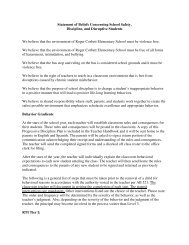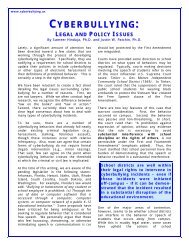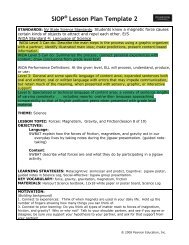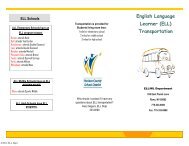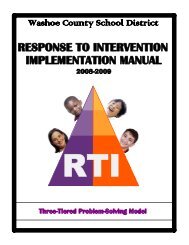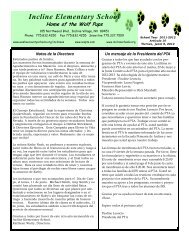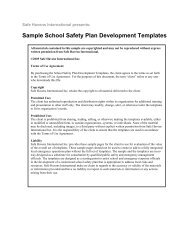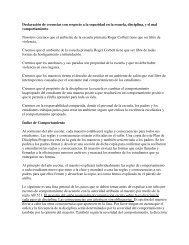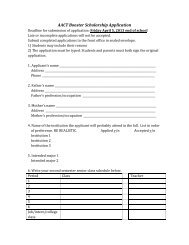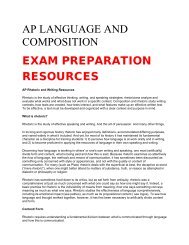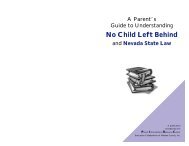Welcome to Week 6 of the Stress Management Email Series!
Welcome to Week 6 of the Stress Management Email Series!
Welcome to Week 6 of the Stress Management Email Series!
You also want an ePaper? Increase the reach of your titles
YUMPU automatically turns print PDFs into web optimized ePapers that Google loves.
WELCOME TO WEEK 6<br />
OF THE STRESS<br />
MANAGEMENT EMAIL<br />
SERIES!<br />
Financial <strong>Management</strong> and <strong>Stress</strong>
FINANCIAL STRESS<br />
Financial stress affects more<br />
than just your wallet: It can<br />
have a ripple affect on your<br />
health and interpersonal<br />
relationships.<br />
Highly financially stressed<br />
people are more likely <strong>to</strong>:<br />
• Lose sleep<br />
• Have severe anxiety<br />
• Take stress out on o<strong>the</strong>rs<br />
• Experience severe depression<br />
• Have ulcers or o<strong>the</strong>r digestive<br />
problems<br />
• Have heart problems or<br />
migraines.
TIPS ON HOW TO DEAL WITH YOUR<br />
FINANCIAL STRESS<br />
<br />
<br />
<br />
<br />
<br />
<br />
<br />
<br />
Talk <strong>to</strong> someone and recognize that you aren’t helpless. Talking <strong>to</strong> a friend,<br />
loved one or financial counselor will prevent bottling <strong>of</strong> stress.<br />
Budgeting is a very important thing. Having a budget gives you confidence<br />
in your personal financial strategy, which can help you dramatically lower<br />
your financial stress level.<br />
Seek advice about your money problems and <strong>the</strong> steps that you are going <strong>to</strong><br />
reduce financial stress.<br />
Focusing on relationships is a low cost way that can bring yourself<br />
enjoyment and fun in<strong>to</strong> your life.<br />
Prioritize your life and see <strong>the</strong> opportunities <strong>to</strong> focus on what’s important in<br />
your life like your family.<br />
Eat well because stress can lead <strong>to</strong> weight gain and general wear and tear <strong>of</strong><br />
your body.<br />
Get physically active <strong>to</strong> reduce your stress and improve your overall mood.<br />
Take control, ra<strong>the</strong>r than being passive. This will help reduce your stress.
9 WAYS TO TACKLE FINANCES:<br />
OVERCOMING MENTAL OBSTACLES<br />
1. Narrow Your Choices.<br />
It’s <strong>to</strong>o easy <strong>to</strong> allow <strong>the</strong> fear <strong>of</strong> making bad choices keep you from<br />
making any choice at all. Remember: You don’t have <strong>to</strong> make <strong>the</strong><br />
“right” choice or “final” choice, just make a choice <strong>to</strong> act.<br />
2. Ditch Your Defeatist Attitude.<br />
The trick <strong>to</strong> this is <strong>to</strong> find a way <strong>to</strong> believe that somehow, even in<br />
<strong>the</strong> most difficult <strong>of</strong> circumstances, <strong>the</strong>re is hope. Simple things like<br />
making a gratitude list or visualizing yourself free <strong>of</strong> financial stress<br />
can help you feel more hopeful.<br />
3. S<strong>to</strong>p Rowing in Circles.<br />
Picture each household as a boat. If you’re on your own, you’ll have<br />
<strong>to</strong> pull your own weight. If you have a family <strong>to</strong> support, having<br />
someone can make it easier or harder depending if you’re on <strong>the</strong><br />
same page. Make a list and put check marks next <strong>to</strong> <strong>the</strong> items you<br />
both agree upon and question marks next <strong>to</strong> items for compromise.<br />
This will make it easier <strong>to</strong> make a budget <strong>to</strong> agree upon.
9 WAYS TO TACKLE FINANCES:<br />
BUDGETING<br />
4. Make a Budget and Stick <strong>to</strong> it.<br />
In simple terms, put your income at <strong>the</strong> <strong>to</strong>p and deduct expenses. The<br />
amount left over is what you can spend on o<strong>the</strong>r things, such as<br />
reducing debt and increasing savings. Having a written budget gives<br />
you confidence in your personal financial strategy.<br />
5. Cut Expenses.<br />
With <strong>the</strong> right attitude, this can be fun. Have <strong>the</strong> family split up at <strong>the</strong><br />
grocery s<strong>to</strong>re <strong>to</strong> see who can find <strong>the</strong> biggest bargain. Sticking <strong>to</strong> your<br />
written budget will help you cut out <strong>the</strong> things you don’t really need <strong>to</strong><br />
spend money on.<br />
6. Get Rid <strong>of</strong> Debt.<br />
This should be your number one priority. Certain kinds <strong>of</strong> debt<br />
(mortgages, student loans, etc.) can be good in that <strong>the</strong>y can build your<br />
credit rating. You may be able <strong>to</strong> cut costs by restructuring your “good”<br />
credit loans at lower rates. “Bad” credit – credit cards – however, <strong>the</strong><br />
only solution is <strong>to</strong> pay it <strong>of</strong>f as quickly as possible. To accelerate debt<br />
reduction: consolidate balances on<strong>to</strong> <strong>the</strong> lowest-interest card possible,<br />
always pay more than <strong>the</strong> minimum balance and pay <strong>the</strong> most <strong>of</strong>f <strong>the</strong><br />
credit card with <strong>the</strong> highest interest rate.
9 WAYS TO TACKLE FINANCES: SAVING<br />
STRATEGIES<br />
7. Retirement Savings Strategies.<br />
As an employee <strong>of</strong> an educational institution, you have <strong>the</strong> option <strong>of</strong> a<br />
retirement account known as a 403(b). Contributions are made on a pre-tax basis<br />
which can greatly reduce your tax bill. The tax savings magnifies as your<br />
contribution increases. Your earnings in this fund will grow tax-free until time<br />
<strong>of</strong> withdrawal. Any fund that contributes <strong>to</strong>ward retirement will greatly reduce<br />
your stress because saving money ensures a better quality <strong>of</strong> life after you retire.<br />
8. Improve your Credit Score.<br />
Credi<strong>to</strong>rs who have scores <strong>of</strong> 760+ have access <strong>to</strong> <strong>the</strong> best rates. Pulling up a low<br />
credit score is a long, painstaking process <strong>of</strong> paying your bills on time, building<br />
equity and repaying debt. Don’t get discouraged, it takes time but it will be a<br />
rewarding experience when you get <strong>to</strong> your goal.<br />
9. Coupons!<br />
They are all over <strong>the</strong> internet and phone apps. You don’t have <strong>to</strong> become an<br />
“extreme couponer” but enjoy <strong>the</strong> benefits <strong>of</strong> coupons. When couponing, be<br />
organized. Use apps that’ll keep track for you or organize paper ones by date and<br />
type so <strong>the</strong>y don’t expire. Only buy what you need when couponing. Only clip<br />
coupons for products you’ll actually use.
FINANCIAL STRESS AND YOUR<br />
RELATIONSHIP<br />
Communicate.<br />
When you avoid talking about<br />
money with your significant<br />
o<strong>the</strong>r, problems become worse.<br />
Financial stress causes everyone <strong>to</strong><br />
become more sensitive and we<br />
may avoid discussion about it.<br />
Problems cannot be solved unless<br />
<strong>the</strong>y are discussed or aired out.<br />
Make a Plan.<br />
Set a budget and time each week<br />
<strong>to</strong> sit down and talk about your<br />
budget with your significant<br />
o<strong>the</strong>r. This will help you both stay<br />
focused on possible problems.<br />
Share Financial Responsibilities.<br />
Both you and your significant<br />
o<strong>the</strong>r should be involved in <strong>the</strong><br />
finances. One may make a higher<br />
income but this doesn’t mean both<br />
aren’t equally responsible. Sharing<br />
<strong>the</strong> responsibility keeps <strong>the</strong> o<strong>the</strong>r<br />
from feeling over-burdened, which<br />
lessens <strong>the</strong> stress that negatively<br />
reflects your relationship.<br />
Have an Emergency Plan.<br />
Stash some cash away for a rainy<br />
day. Setting aside savings could be<br />
your saving grace if ei<strong>the</strong>r one <strong>of</strong><br />
you lose your job or have your<br />
hours cut.<br />
*Remember As long as you have a ro<strong>of</strong> over your head and food on <strong>the</strong><br />
table, things may not be as bad as <strong>the</strong>y seem. Be appreciative that you<br />
still have one ano<strong>the</strong>r.
EASY WAYS TO SAVE MONEY<br />
Cook at home <strong>of</strong>ten.<br />
Make your own c<strong>of</strong>fee.<br />
Brown bag lunch a few days a<br />
week.<br />
Go grocery shopping while in<br />
a hurry – armed with a list.<br />
Watch out for expiration<br />
dates on perishables.<br />
Buy in bulk when possible –<br />
cereals, rice, beans,<br />
<strong>to</strong>othpaste, body wash, <strong>to</strong>ilet<br />
paper.<br />
Buy generic products<br />
whenever possible – cereal,<br />
milk.<br />
Disconnect land line if<br />
possible.<br />
Borrow books from <strong>the</strong> library<br />
instead <strong>of</strong> buying <strong>the</strong>m.<br />
Avoid impulse buying.<br />
Avoid vending machines.<br />
Ride your bike or carpool whenever<br />
possible.<br />
Catch <strong>the</strong> matinee showing for a<br />
cheaper movie.<br />
Plan vacations ahead <strong>of</strong> time.<br />
Keep a distance from lavish highroller<br />
friends.<br />
Use grocery s<strong>to</strong>re bags <strong>to</strong> line trash<br />
cans.
INSTANT STRESS BUSTERS<br />
Lie on your back and position a tennis ball under your<br />
tense points – your lower back, between your shoulder<br />
blades, etc. Roll gently up and down and side <strong>to</strong> side.<br />
Soak a hand <strong>to</strong>wel and microwave for two minutes<br />
until steamy. Place on back <strong>of</strong> neck, face or achy<br />
hands.<br />
Pick up a bouquet <strong>of</strong> purple, blue or green flowers.<br />
These colors have a calming effect. Place in a glass<br />
bowl so you can see <strong>the</strong> water and keep it on your<br />
desk.
STRESS IS NOT WHAT HAPPENS TO<br />
US. IT’S OUR RESPONSE TO WHAT<br />
HAPPENS TO US. AND RESPONSE<br />
IS SOMETHING WE CAN CHOOSE.<br />
-UNKNOWN
ADDITIONAL RESOURCES<br />
http://www.nytimes.com/2009/04/09/health/09stressbox.html_<br />
r=2& Coping with Financial <strong>Stress</strong><br />
http://hcp.nku.edu/counselingservices/clienteducation/financial<br />
stress.php Financial <strong>Stress</strong><br />
Or for personalized consultations (for District employees and/or<br />
<strong>the</strong>ir households) contact:<br />
Mountain Employee Assistance Program<br />
1091 Haskell Street<br />
Reno, NV 89509<br />
(775) 322-6066<br />
www.mountaineap.com<br />
mountaineap@gmail.com



